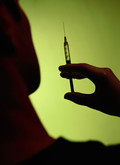Biosimilars/News
|
Posted 22/06/2012
South Korean biotechnology company Celltrion presented the PLANET clinical studies results of phase I and phase III trials for its first monoclonal antibody biosimilar (CT-P13) of Johnson & Johnson’s rheumatoid arthritis blockbuster Remicade (infliximab) at the Annual Congress of the European League Against Rheumatism (EULAR) held in Berlin, Germany, on 6–9 June 2012. The results demonstrated the biosimilarity of CT-P13 to the reference drug, supporting the company’s intention to launch the biosimilar monoclonal antibody globally.























